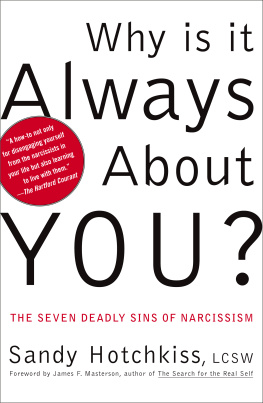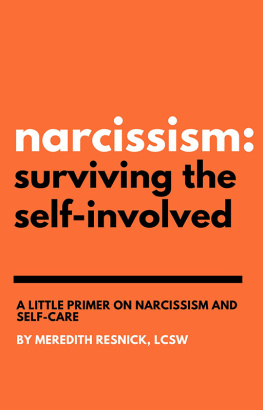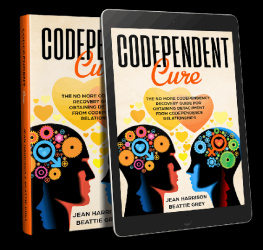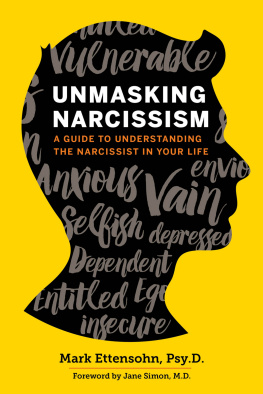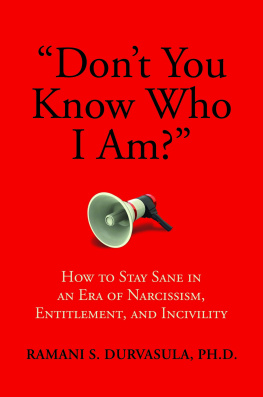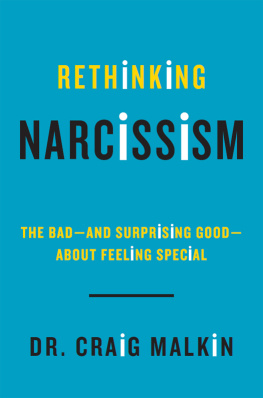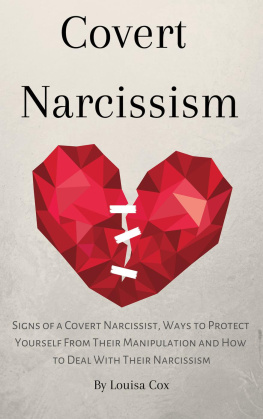
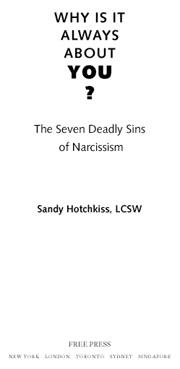

FREE PRESS
A Division of Simon & Schuster, Inc.
1230 Avenue of the Americas
New York, NY 10020
www.SimonandSchuster.com
Copyright 2002, 2003 by Sandy Hotchkiss
All rights reserved, including the right of reproduction in whole or in part in any form.
First FREE PRESS trade paperback edition 2003
FREE PRESS and colophon are trademarks of Simon & Schuster Inc.
Designed by Jan Pisciotta
Manufactured in the United States of America
1 3 5 7 9 10 8 6 4 2
Library of Congress Cataloging-in-Publication Data
Hotchkiss, Sandy
Why is it always about you? the seven deadly sins of narcissism / Sandy Hotchkiss.
p. cm.
Includes bibliographical references (p.) and index.
l. Narcissism I.Title
BF575H68 2002
158.2dc21 2-1-54516
ISBN 0-7432-1427-7
eISBN: 978-1-439-10653-2
0-7432-1428-5 (Pbk)
For information regarding special discounts for bulk purchases, please contact Simon & Schuster Special Sales at 1-800-456-6798 or business@simonandschuster.com
www.simonspeakers.com
For Donald Ever a friend to my excitement
This book was in my head for five years before I began putting it on paper, and many people have nurtured it along the way.
I wish to thank my patients, who confirmed my belief that a book about why Narcissists act the way they do had a place in the world. Their struggles to extricate themselves from the webs cast by narcissistic parents, lovers, spouses, bosses, and friends made psychoanalytic theory come alive for me and showed me how it is possible to develop a whole and separate Self beyond childhood. I am particularly grateful to those who gave permission for me to share their stories in these pages.
I also wish to thank all of my professional colleagues who supported me when I decided to cancel my managed-care contracts in late 1997. Giving up more than half of my practice created the time to write this book, but it also meant a loss of income. I am fortunate to be part of a community that has helped me keep my doors open through a very tumultuous time in the history of psychotherapy, when managed care has taken control of the therapy process and threatens the very essence of what we do that is helpful.
Thanks, too, to my wonderful husband, Donald Hildreth, who dragged me from the dark ages of legal pads and ballpoint pens, electric typewriters and Wite-Out, to the joys of the word processor. I wrote the first several chapters of this book sitting back-to-back with him in his art studio, me at his computer and he at his easel, in the feng shui corner of our house. Ultimately, he bought me my own little laptop, and a whole new world opened up. Thank you for bringing me into the light, and for always being the light of my life.
This book could not have been conceived, let alone published, without the significant contributions of James Masterson, M.D. I discovered the Masterson Approach to treating Disorders of the Self in 1987, and his clear, sound, and utterly relevant model has been the foundation of my clinical work throughout my career. In early 2000, he generously agreed to read portions of the manuscript and ultimately opened the door for me at Simon & Schuster. That he was also willing to write my Foreword is an honor I will treasure for a lifetime.
Writing this book has brought me in closer contact with many delightful people who have each been instrumental as the journey unfolded. Topping the list is my dear friend and colleague Suzanne Lake, Psy.D., who read every draft of the manuscript, offering tireless encouragement through countless anxious moments. My agent, Peter Fleming, will always be dear to me as the first person from the literary world to express enthusiasm about my ideas. Elizabeth Knowles of Harvard Press and Kitty Moore at Guilford generously gave time and feedback on early drafts. Emily Brown, LCSW, has been a model and an advisor. Aileen Berg, a gift from heaven, provided the essential link to ultimate publication. And my stepson, Jeremy Hildreth, made it happen with the Only You Can Prevent Narcissism T-shirt that brought Aileen and me together. What serendipity!
Thanks also go to Kathy Coss, Colleen Garner, Carol Schwartz, and Whitney Wagner for their impressions of early drafts of the manuscript. Thank you, moms and girlfriends!
My experience at The Free Press has been wonderful from the outset. Thanks so much to Trish Todd, who listened to her friend Aileen Berg and passed my proposal on to Philip Rappaport, who has been a sweetheart of an editor. Immersing oneself in narcissism can activate anger, and Philips kindness and optimism helped me keep my balance through the revision process. Thanks also to Philips able assistant Elizabeth Haymaker for putting my manuscript on disk.
Part III: Defending Your Self: Survival Strategies
for a Narcissistic World
People who are involved in business and/or close relationships with people who have Narcissistic Personality Disorder are often bewildered and perplexed by the extraordinary contradictions of their behavior, in contrast to the underlying enduring consistency of their narcissistic needs. These needs are expressed in their grandiose search for constant admiration, underneath which lies an exquisite vulnerability to the slightest rebuff, which then evokes devastating shame. Their behavior can be charismatic and charming one minute, cold and calculating the next, or on occasion breaking into unpredictable rages.
I have often seen this bewilderment in the parents, spouses, and children of patients in treatment. They cannot believe what their perception is telling them: that the patient is caught in the unvarying cycle of narcissistic vulnerability and defense.
I have long wished we had a book that provides an understanding of the cyclical vicissitudes of this problem, as well as the possibilities offered by treatment.
At last we do have such a book: Why Is It Always About You? by Sandy Hotchkiss, LCSW. This book is beautifully written and a pleasure to read. Ms. Hotchkiss has marshaled and integrated the considerable professional literature on the subject and translated it into plain English for the lay reader. Highly technical concepts are explained and concretely illustrated in detail. Excellent references are noted with each chapter. This volume fills a vast void in the literature and is a must-read for anyone, whether a professional or a layperson, seeking a better understanding of the Narcissistic Personality Disorder.
James F. Masterson, M.D.
Director, Masterson Institute for Psychoanalytic Psychotherapy
Emeritus Professor of Psychiatry
Cornell University Medical College, New York Hospital
Next page
